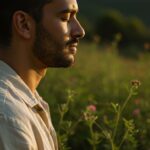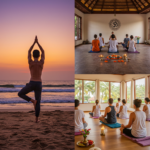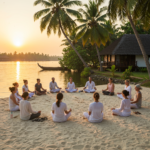In the relentless hum of modern life, amidst the endless notifications and the constant pressure to be something, do something, achieve something, a quiet yearning often stirs. It’s a pull towards something deeper, a desire to understand who we truly are beneath the layers of roles, expectations, and the ceaseless chatter of the mind. Many seek solace in vacations, a temporary escape. But some feel a call for something more fundamental, a dedicated space not just for rest, but for profound self-discovery. It’s for these seekers that experiences like the Enlightenment Intensive exist, offering not a gentle pause, but a deep dive into the very nature of being.
VISIT THE RETREAT WEBSITE FOR MORE
INFORMATION & PRICES
The Enlightenment Intensive, or EI, isn’t your typical wellness getaway. It’s a specific, highly structured, and undeniably demanding path designed to facilitate a direct, conscious knowing of one’s True Self. Originating in the 1960s with Charles Berner, later known as Yogeshwar Muni, the EI method emerged from a unique synthesis. Berner ingeniously combined the ancient Eastern practice of self-enquiry meditation, famously exemplified by Ramana Maharshi’s potent question “Who Am I?”, with structured Western interpersonal communication techniques, particularly the dyad format. The explicit goal is ambitious yet simple: to accelerate the process of enlightenment, helping participants move beyond intellectual understanding or belief systems to have a direct, unmediated experience of Truth, of their own essential nature. It’s about cracking open the masks of ego and conditioning to allow what is fundamentally real to bloom.
Within this specialized world of intensive retreats, The Lotus Centre’s 5-Day Enlightenment Intensive offers a unique container. Held not in a luxury spa but amidst the raw, soul-stirring landscapes of Newfoundland and Labrador, Canada, this particular retreat promises an “utterly transformational” journey. The setting itself, Canada’s easternmost province, known for its dramatic coastlines, ancient forests, and resilient spirit, seems to whisper an invitation to strip away the superfluous and connect with something elemental. This isn’t positioned as mere relaxation; the very name “Intensive” signals a commitment, a focused period dedicated solely to uncovering the truth of one’s being. The unique blend of deep contemplation and structured communication forms the heart of this method, distinguishing it from silent meditation retreats or encounter-style workshops. It’s this potent combination, held within the embrace of Newfoundland’s wild beauty and guided by experienced hands, that we explore here.
Journey to the Edge of the World: Finding the Tree of Life
Newfoundland and Labrador possesses an undeniable mystique. It’s a land of vast, untamed beauty, where rugged cliffs meet the North Atlantic, ancient boreal rainforests breathe clean, crisp air, and the human footprint feels relatively light against the backdrop of powerful nature. This isn’t a landscape of gentle comforts; it has a raw, majestic quality, a sense of elemental power that can be both humbling and deeply inspiring. It’s within this embrace, far from the urban sprawl, that The Lotus Centre chose to host its Enlightenment Intensive, specifically at the Tree of Life Retreat Centre in the Salmonier River Valley area.
The Tree of Life is not merely a venue; it’s an embodiment of a philosophy. Co-envisioned by the retreat facilitator Meranda Squires and naturalist Ian Goudie, it was conceived as a dedicated space for spiritual practice immersed in nature. This isn’t a resort masquerading as a retreat centre; it’s intentionally rustic, purposefully off-grid. Operating as a sustainable eco-community, the centre generates its own electricity through solar panels and micro-hydro systems, heats with wood stoves, utilizes gravity-fed water plumbing, and grows its own organic vegetables. The buildings themselves reflect this ethos, incorporating natural building techniques, tiny house design principles, and even sacred geometry – the main building, for instance, is said to follow the geometry of the Kabbalistic Tree of Life, while another incorporates the eight-sided pattern known as the Breath of the Compassionate. This deep connection to sustainable living and ancient patterns creates an environment that feels both grounded and energetically attuned.
This deliberate simplicity and immersion in the natural world are fundamental to the retreat’s design. The centre sits on over five acres of land, set back from the main road with few neighbours, ensuring a profound sense of seclusion. Participants have access to the surrounding Fog Forest Trails for contemplation walks, and nearby waterfalls offer opportunities for invigorating swims in pure, natural water. The river itself is described as having a powerful presence, a source of connection for many visitors. This constant, gentle presence of nature – the sounds, the smells, the textures – works in concert with the retreat structure to minimize external distractions. By removing the familiar comforts, conveniences, and stimuli of modern life, the environment itself encourages participants to turn inward, fostering the deep contemplation required by the Enlightenment Intensive process. The venue actively supports the work; it’s not just a backdrop, but an integral part of the methodology, helping to strip away the non-essential and focus the mind. As one visitor beautifully described the feeling of the place, “this place has a magical power… the nature talks to you.”
Accommodation reflects this philosophy of essential living. Guests stay in a shared bunkhouse, featuring a common area with a wood stove, a kitchen, and a bathroom. The sleeping quarters are simple: eight small, private 5×6 foot rooms, each containing a bed, plus an additional bunk bed area. Testimonials confirm this isn’t about luxury; one participant noted it was “basic for the purpose of discovering a simple life,” while another stated plainly, “This is not a luxury resort, it’s a retreat that reminds us that we really don’t need more than basics to be content.” This lack of pampering serves a purpose. It acts as a natural filter, likely attracting individuals who are genuinely committed to the demanding inner work of the Enlightenment Intensive and less concerned with external amenities. Those seeking plush comfort would likely look elsewhere, suggesting that participants arriving at the Tree of Life are prioritizing the depth of the process itself.
Nourishment during the retreat aligns with the holistic and natural ethos. Included in the retreat cost are organic, vegan meals – breakfast, lunch, dinner, snacks, and drinks. The centre caters to specific dietary needs like gluten-free when requested. Testimonials praise the food, describing it as “tasty and satisfying,” “surprisingly good and very filling,” “so so delicious,” and prepared with love – a quality believed to contribute positively to the overall supportive atmosphere of intensive retreats. This attention to wholesome, consciously prepared food further underscores the integrated approach, supporting the body while the mind and spirit engage in the deep work of self-discovery. The synergy between the venue’s sustainable philosophy, the simple living conditions, the nourishing food, and the surrounding natural beauty creates a uniquely cohesive and supportive container for this profound spiritual retreat Canada.
Your Compass in the Wilderness: Meranda Squires and The Lotus Centre
Embarking on a journey as deep and potentially challenging as an Enlightenment Intensive requires not just a conducive environment, but also skilled and trustworthy guidance. At the helm of this particular retreat is Meranda Squires, the founder of The Lotus Centre and co-visionary of the Tree of Life venue. Her connection to Newfoundland runs deep; she grew up on the island, the daughter of the renowned Newfoundland artist Gerald Squires, experiencing the province’s rugged beauty firsthand at the Ferryland lighthouse. Yet, her path diverged early from conventional expectations. When asked about her future plans after high school, her response wasn’t about career or family in the usual sense. “I want to become enlightened,” she declared.
This wasn’t a fleeting whim. Two years later, Meranda journeyed to the Himalayas in India, where she found her guru, Swami Shyam, and immersed herself in study at the International Meditation Institute in Kullu for an extraordinary seventeen years. This period, spanning from age 20 to 37, wasn’t a casual exploration; it was a deep dive into the core practices and philosophies underpinning the yogic path. She became a devout student of meditation, yoga, and Vedanta philosophy, engaging in daily Satsang (gatherings for spiritual discourse), learning chanting, and developing her understanding through direct guidance. This extensive, long-term immersion provides a foundation of authentic experience and deep knowledge that goes far beyond typical yoga teacher training programs.
In 2000, feeling called to bring her experiences back home, Meranda returned to Newfoundland and established The Lotus Centre in downtown St. John’s, nestled within her father’s art gallery. The Centre has since become a vibrant hub for those seeking authentic Eastern practices and a yogic lifestyle. As a Yoga Alliance certified training school, it offers comprehensive yoga teacher trainings, meditation courses, workshops, and retreats, fostering a supportive community grounded in yoga, meditation, philosophy, chanting, natural living, and authentic communication.
Meranda’s qualifications reflect both her deep Eastern training and her specific expertise in the Western techniques relevant to the Enlightenment Intensive. From her time in India, she holds certifications as a teacher in Advanced Studies in Yoga Science, Vedant Philosophy, the Theory and Practice of Meditation, and Soma Yoga. Crucially, she also trained extensively with Lawrence Noyes Seminars in the US, earning certifications as an Enlightenment Master, a Mind Clearer, a Couples Mind Clearer, and an Emotion Clearer. This specific training as an Enlightenment Master is directly relevant to facilitating the EI process. Additionally, she holds certifications in Thai-yoga Bodywork, Kripalu Yoga, and Paramanand Laya Yoga. This diverse yet interconnected skill set suggests a holistic understanding of the mind-body-spirit continuum, enabling her to guide participants through the multifaceted experiences that can arise during an intensive retreat.
Her stated life purpose is “to empower people to live in true freedom, and to raise awareness of the Truth of who we are; our interconnectedness with the whole.” This philosophy permeates her approach. She is described not as a guru dispensing answers, but as a facilitator, a guide who holds the space, provides the structure (including lectures and spiritual guidance mentioned in the retreat schedule), and utilizes her extensive training to support each participant’s unique journey of self-discovery retreat. The EI Master’s role, as understood within the tradition, is precisely this: to inspire and facilitate the individual’s process, not to impose beliefs. Furthermore, her commitment to accessibility, offering bartering options, payment plans, and keeping fees low “to assure no one is denied access to spiritual growth,” aligns with the retreat’s relatively modest cost and reinforces a sense of integrity and genuine service that distinguishes it from more commercialized wellness offerings. Her deep authenticity, born from decades of dedicated practice and training, combined with her specific EI Master certification and holistic approach, makes her a uniquely qualified guide for this profound undertaking.
The Practice of Unknowing: Diving Deep with Dyads
At the very core of the Enlightenment Intensive lies a deceptively simple yet profoundly powerful practice: the dyad. This structured communication exercise is the engine driving the process, the primary tool used to navigate the inner landscape in search of direct self-knowledge. The journey typically begins with a fundamental question, most often the classic Zen koan echoed by Ramana Maharshi: “Who Am I?”. While other questions like “What am I?”, “What is Life?”, or “What is Another?” might also be used, the purpose remains the same. It’s not about formulating a clever or satisfying intellectual answer. Instead, the question acts as a relentless pointer, directing attention away from the conditioned mind and its endless stories, towards the direct, felt experience of existence itself.
The dyad technique structures this inquiry within a relational context. Participants pair up, sitting face-to-face. For a set period, usually five minutes, one person actively contemplates the question, focusing inward. They then communicate to their partner whatever arises in their direct experience in that moment – thoughts, feelings, sensations, images, emptiness, confusion, resistance – without censoring or analyzing. The partner’s role is crucial: they listen. They listen actively, attentively, and in complete silence, offering their presence as a receptive space without any verbal or non-verbal feedback, judgment, interpretation, or advice. After the five minutes, the roles switch. The listener becomes the communicator, and the communicator becomes the listener. This cycle repeats for the duration of the dyad period, typically around 30 to 45 minutes. Following the dyad, participants usually find a new partner for the next session, ensuring a variety of interactions throughout the retreat.
Why this emphasis on communication? It might seem counter-intuitive for a process aimed at enlightenment, often associated with deep silence. However, Charles Berner’s insight was that this structured interaction significantly accelerates the process compared to purely solitary contemplation. The act of verbalizing one’s present-moment experience helps to bring awareness to the layers of identification – the thoughts, beliefs, emotions, and self-images that construct our sense of self. By expressing these authentically and having them received without judgment, participants can begin to see through them, to loosen their grip. The non-judgmental listening creates a field of safety and acceptance, allowing for vulnerability and the surfacing of deeper material. The “contact” and “mutual acceptance” generated within the dyads are considered key elements, melting away pretense and allowing the authentic self to emerge. Rather than getting stuck circulating thoughts and feelings internally, the dyad provides a structured way to witness and release them, clearing the path for a deeper truth to dawn.
This core practice is embedded within a highly structured and intensive daily schedule, designed explicitly to maximize focus and minimize distractions. The days start early, typically with participants rising around 5:50 AM. The schedule is rigorous, dominated by the dyad practice – an intense 10 to 12 sessions each day. These intense periods of focused inquiry and communication are carefully interspersed with other activities, all conducted in silence unless otherwise specified (like during lectures or chanting). Silent contemplation walks in the beautiful natural surroundings of the Tree of Life allow for integration and quiet reflection. Silent vegetarian meals provide necessary sustenance. Periods are allocated for rest, gentle exercise or yoga, and facilitator-led lectures that likely offer context, guidance, and support for the process. Meditation and potentially chanting sessions further deepen the contemplative atmosphere. The entire structure, from the early start to the evening sessions ending around 10:30 PM, is meticulously designed to keep participants consistently engaged with the inquiry, preventing the mind from easily drifting back into habitual patterns or external concerns. Adherence to this schedule and the specific dyad technique is considered crucial for the effectiveness of the Enlightenment Intensive. The intensity is palpable and purposeful, creating a powerful container dedicated solely to the profound work of this self-discovery retreat.
VISIT THE RETREAT WEBSITE FOR MORE
INFORMATION & PRICES
Through the Layers: Embracing the Intensive’s Ebb and Flow
The journey through an Enlightenment Intensive is rarely a smooth, linear ascent towards bliss. It’s more accurately described as a descent through the layers of the self, a process of uncovering and “letting go of everything you are not,” as one description puts it. Participants navigate a complex inner landscape, encountering various states of mind and emotion as the intensive pressure brings hidden aspects of the psyche to the surface. Understanding the potential terrain can be helpful, not as a rigid map, but as a guide to common territories one might traverse.
Based on materials from The Lotus Centre itself, the process often begins with the mind offering up habitual responses. Initially, participants might find themselves formulating intellectual answers or descriptions in response to the “Who Am I?” question – relying on education, logic, or pre-existing beliefs. These answers, while perhaps articulate, don’t typically lead to the direct experience sought. Memories may also surface strongly – recollections of childhood, past relationships, significant life events. While useful for understanding personal history and providing content for communication in the dyads, these memories themselves are not the direct experience of Truth.
As the intensive progresses and the layers begin to peel back, participants often encounter inner restraints, fears, and conditioned patterns. This can lead to significant insights and emotional releases – moments of clarity about lifelong patterns (“Oh God, I’ve just been trying to live for my parents!”) or deep emotional outpourings. These breakthroughs can feel profoundly therapeutic and valuable, offering psychological relief and self-understanding. However, within the EI framework, these are considered important steps along the way, perhaps necessary clearing, but distinct from the ultimate goal of direct enlightenment. There’s a clear caution against confusing these valuable psychological insights with the non-conceptual, direct knowing of one’s essential nature.
The journey might involve periods of actively “trying” to grasp the Truth, a kind of inner searching or “chasing” where one attempts to locate the Self conceptually, perhaps feeling it’s “behind the eyeballs” or elsewhere in the body-mind. This effortful striving is a natural stage but often precedes a shift. Participants might also enter a state described as “no-man’s land” – a space of mental emptiness where thoughts seem distant, unimportant, or cease altogether. While potentially peaceful, this state requires awareness to avoid stagnation.
Physical phenomena can also arise, particularly around the second day – sensations of heat in the body, mild visual distortions, or other unusual physical experiences. The guidance is generally not to resist these but to simply notice them and perhaps turn the inquiry towards them: “Who is feeling the heat?”. Strong emotions are also common territory – waves of laughter, tears, frustration, boredom, or apathy can surface unexpectedly as defenses lower. Periods of deep inner peace and serenity might also occur. While welcome, even this state carries a potential pitfall noted in some EI literature as the “cave of satan” – a comfortable stillness where one might cease striving for the ultimate Truth, mistaking profound calm for the final realization.
Perhaps the most challenging phase, often occurring around the third day of a longer intensive, is described as a potential “crisis” or “ego death.” This is depicted as a critical juncture, a confrontation between the ego’s ingrained structures, desires, and fears, and the dawning reality of something beyond it. It can be a period of intense difficulty, potentially touching on existential fears, as the very foundation of the constructed self is shaken. Navigating this requires persistence and trust in the process.
Throughout this demanding ebb and flow, the structure of the Enlightenment Intensive provides a crucial container. The safety created by the non-judgmental listening in the dyads, the facilitator’s experienced guidance (drawing on techniques like Mind Clearing perhaps), and the supportive, focused environment allow participants to move through these challenging states. The intensity is undeniable, acknowledged in various descriptions as “highly demanding,” “subtle and at times seems very difficult,” yet it’s this very intensity, held within a safe structure, that facilitates the potential for profound breakthrough on this unique spiritual retreat Canada.
VISIT THE RETREAT WEBSITE FOR MORE
INFORMATION & PRICES
Emerging into the Light: The Potential Fruits of the Intensive
While the path of an Enlightenment Intensive can involve navigating challenging inner terrain, the potential culmination is profound: a direct experience of enlightenment. Often referred to using terms like “Satori” (a Zen term for a glimpse of enlightenment) or simply “Awakening,” this isn’t about acquiring new knowledge or achieving a specific state defined by dogma. Instead, it’s described as a direct knowing, a self-realization, an unmediated contact with the Truth of who and what you are, free from the filters of the conditioned mind and ego structures. It’s a shift in consciousness, an awakening to the reality that underlies all appearances, often described as indescribable yet utterly self-evident once experienced. Participants might speak from a place of newfound inner authenticity, depth, and lightness, feeling, as one source poetically puts it, “reborn into the great room” where Truth is obvious.
However, the value of The Lotus Centre’s Enlightenment Intensive often extends beyond a single peak experience, fundamental though that may be. The rigorous process itself, combined with the supportive environment, tends to cultivate a range of lasting benefits that ripple through a participant’s life. Many report emerging with an enhanced capacity to be present in their daily lives, a greater sense of self-acceptance, and a deeper connection to their own authenticity. The dyad practice, while focused on self-inquiry, inherently cultivates crucial relational skills; participants often find improvements in their listening capacity, their ability to communicate honestly and spontaneously from the heart, and a greater ease and depth in relating with others.
The deep dive into the question “Who Am I?” can lead to a renewed sense of purpose, a clarity that cuts through confusion. Feelings of joy, inner peace, flowing energy, and a pervasive sense of love – not just as fleeting emotions but as underlying states of being – are frequently reported outcomes. The journey often fosters a greater trust – trust in oneself, trust in others, and trust in the unfolding of life itself. Increased compassion, both for oneself and others, naturally arises from the direct experience of interconnectedness and the shedding of egoic defenses. Fundamentally, the intensive aims to facilitate a shift from living based on the fantasies and projections of the ego to living grounded in reality, fostering natural authority and a still center within.
Echoing these potential outcomes, testimonials from participants of The Lotus Centre’s retreats (including Laya Yoga retreats held at the same venue with the same facilitator, which share philosophical underpinnings) speak volumes about the impact. Phrases like “life-changing experience,” “full of learning, healing, and getting back to myself,” “found a way back to myself that has long laid dormant,” “deeper dive… profound and exciting,” “truly authentic, safe, and life-changing,” and “deeply enlightening” appear frequently. Participants describe connections with others as “nourishing for the soul” and speak of finding “more joy in simplicity and gratitude.” These personal accounts ground the profound potential of the retreat in relatable human terms.
It’s also important to understand that an enlightenment experience, however profound, is often seen as a beginning rather than an end point. The EI framework acknowledges the concept of integration – the process of allowing the insights and shifts gained during the retreat to permeate daily life. Some sources mention the development of a “Steady State,” a more continuous state of being centered in the True Self, which unfolds gradually after an initial awakening. Post-enlightenment work might involve ongoing practices like mindfulness in each moment, continued self-practice, seeking community support, and further contemplation to deepen and stabilize the realization. As one resource candidly notes, a direct experience won’t magically solve all life’s problems or pay the bills, but knowing the core of one’s being can change everything about how those problems are met. This self-discovery retreat offers not just a potential peak, but tools and perspectives for a fundamentally transformed way of living.
VISIT THE RETREAT WEBSITE FOR MORE
INFORMATION & PRICES
Answering the Call: Is This Newfoundland Journey for You?
The 5-Day Enlightenment Intensive offered by The Lotus Centre at the Tree of Life Retreat Centre presents a unique and potent opportunity for self-exploration. It stands apart through a distinct combination of elements: the rigorous, time-tested Enlightenment Intensive methodology focused squarely on facilitating direct experience; the guidance of Meranda Squires, a facilitator with decades of deep immersion in relevant Eastern traditions and specific Western training as an Enlightenment Master; the intentionally rustic, off-grid, and deeply nature-immersed venue in Newfoundland’s Salmonier Valley, designed to support inward focus; and an underlying philosophy that eschews dogma in favour of personal discovery.
So, who is this demanding yet potentially deeply rewarding journey for? It resonates most strongly with individuals genuinely committed to profound self-knowledge, those who feel an inner calling to understand the truth of their own existence beyond surface appearances. It requires a willingness to embrace intensity, to sit with discomfort, and to persist through challenging inner states. Prospective participants should be comfortable with, or at least open to, basic, shared accommodation and a simple, sustainable living environment deeply connected to nature. Crucially, one must be willing to engage fully with the core EI methodology – the relentless self-contemplation combined with structured, authentic communication in dyads – and to commit to the intensive schedule, dropping other practices and distractions like phones and reading materials for the duration. The stated skill level is “Intermediate,” suggesting some prior experience with self-reflection or spiritual practice might be beneficial, though the primary requirement is sincere intention.
Conversely, it’s equally important to recognise who might find this retreat unsuitable. Those seeking a relaxing holiday, luxurious amenities, spa treatments, or gourmet indulgence will not find them here; testimonials explicitly state it is “not a luxury resort.” Individuals looking for a purely silent meditation retreat might be uncomfortable with the central role of verbal communication in the dyads. Likewise, those who prefer unstructured time or are resistant to disciplined schedules and interpersonal exercises may struggle with the format. The intensity is real, and the focus is squarely on inner work, not external comforts. Honesty about the retreat’s demanding nature and simple setting is crucial for managing expectations.
Considering the value proposition, the monetary cost – listed from US$468 for a shared room for the 5 days/4 nights, including accommodation, all organic vegan meals, and even airport transfer from St. John’s International Airport – appears remarkably accessible, especially when compared to many multi-day residential retreats. This aligns with Meranda Squires’ stated philosophy of making spiritual growth accessible. However, the true value lies far beyond the price tag. It resides in the potential for profound, life-altering self-discovery, the possibility of directly experiencing one’s essential nature, and the acquisition of deeper self-awareness and relational skills that can inform one’s life long after leaving the retreat. The value is measured in transformation, facilitated by an expert guide within a uniquely supportive, focused, and nature-infused container.
Ultimately, choosing to attend an Enlightenment Intensive like this one at The Lotus Centre is about answering a specific kind of inner call. It’s an invitation to step away from the familiar noise and distractions, to journey to the edge of the world – both geographically and internally – and to dedicate oneself fully, for a focused period, to the most fundamental inquiry: “Who Am I?”. It promises a path that is challenging, demanding, and requires courage, yet holds the potential for incomparable rewards – the discovery of the stillness, the truth, and the freedom waiting patiently at the core of one’s own being, held within the wild, potent beauty of Newfoundland. This spiritual retreat Canada offers a rare doorway for those truly ready to walk through it.











